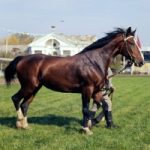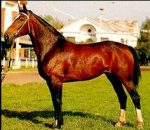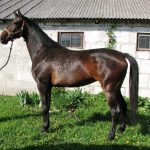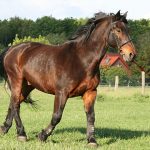Latvian Horse
The Latvian Horse, also known as Latviiskaya, is a breed of robust, all-purpose horses from Latvia developed at the beginning of the twentieth century. The breed is commonly distinguished into two types – the harness type and the saddle type; although, the modern Latvian horses have a combination of the characteristics of both the harness and saddle types.
Latvian Horse Pictures
- Latvian Horse Images
- Latvian Horse Pictures
- Latvian Horse Stallion
- Latvian Horse
Quick Information
| Other Names | Latvian Harness Horse, Latvijas šķirne (Latvian), Latvian Carriage Horse, Latviiskii upryazhnyi (Russian), Latvian Riding Horse, Latvian Draft, Latvian Coach Horse |
| Temperament/ Personality | Willing, docile, strong-willed, gentle |
| Physical Characteristics | Well-proportioned and solidly built, well-developed muscles, solid bone structure, broad chest; moderately pronounced and sloping withers, properly set legs, well-developed hocks and knee joints |
| Colors | Black, brown, bay; chestnut is rare |
| Height (size) | Stallions: 160-164 cm (height at the withers), oblique body length is about 166 cm, chest girth is 190 cm, cannon bone girth is 23 cm Mares: about 161 cm (height at the withers), 167 cm (average oblique body length), about 191 cm (chest girth), 22 cm (average cannon bone girth) |
| Weight | Males: 600 kg Females: 500 kg |
| Blood Type | Warm-blooded |
| Common Uses | In equine sports including dressage, riding, endurance, and jumping; may be used as a harness and draft horse |
| Health | May be affected by deformity of limbs including cow-hocked conformation and ringboned pasterns |
| Gaited | Yes |
| Feeding/Diet | 15 lbs of barley hay or oats, 5-8 lbs of alfalfa/grass hay, 10 lbs of sweet feed |
| Distinguishing Traits | Tall, heavy muscles, bony, stamina, ability to work |
| Country of Origin | Latvia |
| Ancestors | Native horses, Oldenburg, Hanoverian, Holstein, East Friesian, Ardennes, Norfolk Roadster |
| Breed Association/Registry | Latvian Horse Breeding Association |
Video: Latvian Horse Training for Equestrian Sports
History and Development
The Latvian horse breed was first developed back in 1856, when local horses from Latvia were crossed with western European harness-type horses including the Hanoverian, Holstein, and Oldenburg. Since a planned breeding program was followed, over 100 Oldenburg horses including 42 mares and 65 stallions were brought from the Netherlands and Germany during 1920-1941. In addition to these purebred horses, Ardennes, Norfolk Roadster, East Friesians, and Hanoverians were included in the breeding stock.
In 1927, a breed registry was established while the Latvian horse received official recognition in 1952. Previously, the harness-type Latvians were predominant; but after 1960, development of equestrian sports in Latvia led to the increased demand for sport-type Latvian horses, which were produced by mixing Hanoverian, Arabian, and Thoroughbred blood. Improved by limited crossing and pure breeding, the Latvian horses are now produced mainly at the Burnieke state farm, Sigulda experimental farm, and the collective farms of Uzvere and Tervete.







